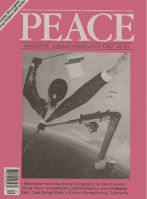
Peace Magazine Jan-Feb 1992, page 11. Some rights reserved.
Search for other articles by Subir Guin here
The assassination of Rajiv Gandhi, increasing border clashes between India and Pakistan, and the sharp devaluation of the rupee, would collectively create havoc in any society. India's other major problems-a burgeoning population, religious fundamentalism, demands for regional autonomy and a critical shortage in foreign exchange -appear to defy solutions.
However, there is some hope that these crises might help to catalyse the nation to implement some vital, albeit unpopular legislation, that not a single party or coalition has been willing to pursue since independence. The nation now has a scapegoat: the IMF, which prescribed harsh medicine in return for a substantial hard currency loan.
The end of the Gandhi dynasty signals a desperate search for a visionary-or a pragmatist-who can hold the nation together. The veteran Narashimham Rao is doing a better job holding the fort than many had predicted.
The power shift in Moscow has reduced the Indo-Soviet Friendship Treaty to an insignificant piece of paper: Yeltsin is too pre-occupied with wooing Western investment to bother about trade and defence commitments. These benefited both partners, enabled India to pay for a large part of her crude oil imports and bolster her military capabilities without having to rely exclusively on the West.
Post-devaluation budget restrictions have compelled military leaders to make drastic cutbacks on every front. This would have a positive outcome if Pakistan and China were under the same pressure to hold the ammunition and negotiate.
Originally from India, Subir Guin is an editor at Peace Magazine.

Peace Magazine Jan-Feb 1992, page 11. Some rights reserved.
Search for other articles by Subir Guin here